
Innovations in Flow Cytometry & Extracellular Vesicles 2024
Alison Fujii Biographical Sketch
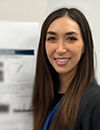
Alison Fujii, Field Application Scientist, ONI Inc.
Alison Fujii is a Field Application Scientist at Oxford Nanoimaging, Inc. (ONI). She specializes in extracellular vesicle research using super-resolution microscopy on the ONI Nanoimager. Alison has worked with flow cytometry in cancer immunology research and collaborates with academic labs and bio/pharma industries to advance microscopy techniques for exploring cellular processes at the nanoscale.
Daniel Chiu Biographical Sketch
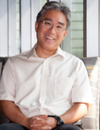
Daniel Chiu, A. Bruce Montgomery Professor of Chemistry, University of Washington
Daniel T. Chiu is currently the A. Bruce Montgomery Professor Chemistry, Endowed Professor of Analytical Chemistry, and Professor of Bioengineering at the University of Washington. He is a member of the University of Washington’s Center for Nanotechnology, Neurobiology and Behavior Program, and the Cancer Consortium of the Fred Hutchinson Cancer Research Center. He has authored more than 180 publications and is the inventor on over 40 issued patents. Dr. Chiu obtained a B.A. in neurobiology and a B.S. in chemistry at the University of California, Berkeley in 1993, and a Ph.D. in chemistry from Stanford University in 1998.
Dino Di Carlo Biographical Sketch

Dino Di Carlo, Armond and Elena Hairapetian Chair in Engineering and Medicine, Professor and Chair of Bioengineering, University of California-Los Angeles
Dino Di Carlo received his B.S. in Bioengineering from the University of California, Berkeley in 2002 and received a Ph.D. in Bioengineering from the University of California, Berkeley and San Francisco in 2006. From 2006-2008 he conducted postdoctoral studies in the Center for Engineering in Medicine at Harvard Medical School. He has been on the faculty in the Department of Bioengineering at UCLA since 2008 and now as Professor of Bioengineering and Mechanical Engineering serves as the Chair of the Department and as the director of the Cancer Nanotechnology Program in the Jonsson Comprehensive Cancer Center. His research pioneered the use of inertial fluid dynamic effects for the control, separation, and analysis of cells in microfluidic devices. His recent work extends into numerous other fields of biomedicine and biotechnology including directed evolution, cell analysis for rapid diagnostics, new amplified molecular assays, next generation biomaterials, and phenotypic drug screening. He has also been a leader in technology entrepreneurship: He co-founded and currently serves on the board of directors of five companies that are commercializing UCLA intellectual property developed in his lab (CytoVale, Vortex Biosciences, Tempo Therapeutics, Forcyte Biotechnologies and Ferrologix). Among other honors he received the Presidential Early Career Award for Scientists and Engineers (PECASE) and was elected a Fellow of the American Institute for Medical and Biological Engineering in 2016, was elected a Fellow of the Royal Society of Chemistry (FRSC) in 2014, was awarded the National Science Foundation (NSF) Faculty Early Career Development award and the U.S. Office of Naval Research (ONR) Young Investigator Award, the Packard Fellowship and Defense Advanced Research Projects Agency (DARPA) Young Faculty Award, and received the National Institutes of Health (NIH) Director’s New Innovator Award and Coulter Translational Research Award.
Eric Diebold Biographical Sketch

Eric Diebold
WW Vice President, Research and Development, BD Biosciences
Eric Diebold is the Worldwide Vice President of Research and Development for BD Biosciences, where he leads all aspects of product and technology development for the Biosciences business unit within Becton Dickinson and Co., one of the world’s largest medical technology companies. Eric has been with BD Biosciences for the past 7 years, where he has served in roles of increasing responsibility within the R&D function. Prior to BD, Eric was the CEO and Founder of Omega Biosystems Incorporated, which was acquired by BD in 2017. Eric received his BS in Electrical Engineering and Physics from Duke University, and his PhD in Applied Physics from Harvard University. He lives in Menlo Park, CA with his wife and three sons.
Gregory Cooksey Biographical Sketch
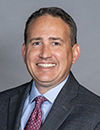
Gregory Cooksey, Project Leader, National Institute of Standards and Technology (NIST)
Dr. Cooksey is a Project Leader in the Microsystems and Nanotechnology Division at the National Institute of Standards and Technology (NIST). His lab develops microfluidic platforms with integrated optical structures to measure fluids, particles, and cells with high precision. His team’s optofluidic flow meter is the most accurate flow metrology platform in the world, and it has a response time on the order of 0.1 s at 1 nL/min. Dr. Cooksey also leads a microfluidic cytometry project that uses multiple interrogation regions to extract first ever per-object uncertainty quantification and measurement of dynamics in flow. This technology was awarded a Gold Medal and the 2023 Ron Brown Excellence in Innovation Award by the U.S. Department of Commerce.
Jean-Luc Fraikin Biographical Sketch

Jean-Luc Fraikin, CEO, Spectradyne
Dr Fraikin developed Spectradyne’s initial Microfluidic Resistive Pulse Sensing technology as part of his PhD thesis work at UC Santa Barbara in the research group of Dr. Andrew Cleland. After graduating he received postdoctoral training in cancer cell biology and biochemistry and worked in industry developing microfluidics-based molecular diagnostics. Dr. Fraikin is a co-founder of Spectradyne and now serves as the company’s CEO.
Jimmy Fay Biographical Sketch
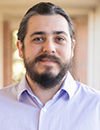
Jimmy Fay, Field Application Scientist , NanoFCM
Jimmy received his PhD from the University of North Carolina in the department of Biochemistry and Biophysics. His thesis work focused on the association of protein and polymers in the context of polyion complex nanoparticles. Subsequently, he moved to industry working on implementing a suite of biophysical assays for the quantitative characterization of extracellular vesicles. Currently, he is a Field Application Scientist at NanoFCM where he works to spread awareness of Nano-flow cytometry and implement novel methodologies using the NanoFCM NanoAnalyzer. In particular, his recent focus has been on surface quantification of biological markers and targeting moieties on nanoparticles.
John Nolan Biographical Sketch

John Nolan, CEO, Cellarcus Biosciences, Inc.
Past President of ISAC. Inventor of Cellarcus’ vesicle analysis technologies. Internationally recognized expert in cytometry and vesicle analysis.
Joseph de Rutte Biographical Sketch
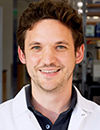
Joseph de Rutte, CEO and Co-Founder, Partillion Bioscience
Dr. Joe de Rutte is the Co-Founder and CEO of Partillion Bioscience, a venture-backed startup that is commercializing the Nanovial technology he pioneered during his PhD at UCLA. This technology utilizes hydrogel microparticles to enable researchers to perform microfluidic assays without the need for new, complex instruments. The impact of his work has been recognized by leaders in the field, earning him the top Innovation Award at SLAS 2020 and the New Product Award in 2022. Since its inception, Dr. de Rutte has led Partillion, successfully raising venture capital funding and launching its first commercial products. These developments address a growing need for functional analysis of cells, showcasing the significant contributions of Dr. de Rutte and his team to the scientific community.
Joshua Welsh Biographical Sketch
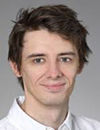
Joshua Welsh, Staff Scientist, Advanced Technology Group, Becton Dickinson
Joshua Welsh, Ph.D., recently joined BD’s Advanced Technology Group as a Staff Scientist where he works on next-generation standardization. He earned his BSc (Hons) in Physiology with Pharmacology from the University of Leicester and completed his Ph.D. in Translational Medicine at the University of Southampton. Dr. Welsh continued his training at the National Institutes of Health, where he advanced to a Staff Scientist role in Dr. Jennifer Jones' Translational Nanobiology Section. Dr. Welsh led initiatives like MISEV2023 and MIFlowCyt-EV, served as a member-at-large on the board of ISEV, chaired the ISEV reference materials task force, and led the ISEV-ISAC-ISTH EV flow cytometry working group. He is also the developer of FCMPASS, an optimization, calibration, and reporting tool for small particle flow cytometry.
Lynn Pulliam Biographical Sketch
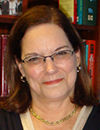
Lynn Pulliam, Professor of Laboratory Medicine and Medicine, University of California-San Francisco
Dr Pulliam received her BA degree from Northwestern University, her MS in Microbiology at California State University at Long Beach and her PhD in Experimental Pathology at the University of California, San Francisco (UCSF). She is a Professor of Laboratory Medicine and Medicine at UCSF and Director of Microbiology at the San Francisco VA Health Care Center. She was the Director of Research at the SF VA, the largest VA research center in the US, for 7 years. She is a founding member and past President of the International Society for Neurovirology (ISNV) as well as the Women in Neuroscience awardee and recipient of the ISNV Pioneer Award. She serves on the Board of Directors of ISNV and the Editorial Boards of several journals. She has also received awards from AmFar, the Northern California Institute for Research and Education and Drexel University Prize in Neurovirology.
Malgorzata Witek Biographical Sketch
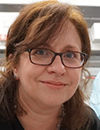
Malgorzata Witek, Associate Research Professor, University of Kansas
Dr. Malgorzata (Maggie) A. Witek is an Associate Research Professor at KU, Lawrence. Her research is focused on microfluidic-based isolation and solid-phase extractions of liquid biopsy markers, including circulating tumor cells, extracellular vesicles, and cell free DNA for stroke and cancer disease management. She shares her research efforts between the University of Kansas in the NIH/NIBIB funded Center of BioModular Multiscale Systems for Precision Medicine and the COBRE funded Kansas Institute for Precision Medicine at the University of Kansas Medical Center (KUMC). Maggie co-directs the Liquid Biopsy Core at KUMC campus.
Michael Graner Biographical Sketch
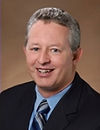
Michael Graner, Professor, Dept of Neurosurgery, University of Colorado Anschutz School of Medicine
Michael Graner received his PhD in Biochemistry from the University of Illinois followed by post-doctoral and research faculty work at the University of Arizona, shifting gears from the Drosophila extracellular matrix to cancer immunotherapy. He then took at faculty position at Duke University’s Tisch Brain Tumor Center, followed by his current position as Professor in Neurosurgery at the University of Colorado Denver (Anschutz Medical Campus). He is also a member of the University of Colorado Cancer Center, the Colorado Clinical and Translational Sciences Institute, the MAVRC Program, and holds a Visiting Professorship Appointment at the Shenzhen Third People’s Hospital (China) and an adjunct faculty appointment at Colorado State University. Graner has a long-standing interest in cell stress responses, which led to cancer vaccine development (including one in clinical trials), which somehow led to the world of extracellular vesicles (EVs). His lab currently concentrates on signaling mechanisms involving EVs, in particular the transfer of stressed phenotypes from stressed tumor cells to unstressed ones via EVs.
Paul Patrone Biographical Sketch
Paul Patrone, Physicist and Staff Scientist, Applied and Computational Mathematics Division, National Institute of Standards and Technology (NIST)
Paul Patrone is a physicist in the Applied and Computational Mathematics Division at NIST with a background in mathematical modeling, stochastics, uncertainty quantification, and analysis. For over a decade he has worked on problems at the interface of applied mathematics, physics, and measurement science. He is a co-inventor on multiple patents and patents-pending, including for the world’s most sensitive flow-meter and a novel microfluidic serial cytometer.
Ramin Hakami Biographical Sketch
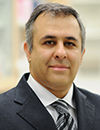
Ramin Hakami, Co-Director of the Center for Infectious Disease Research, George Mason University
Dr. Hakami obtained his Ph.D. in Biochemistry in the laboratory of the Nobel Laureate Professor Har Gobind Khorana at the Massachusetts Institute of Technology (MIT), and was subsequently awarded a NRSA fellowship from NIH to complete postdoctoral training at Harvard Medical School (HMS). He is currently the co-director of the Center for Infectious Disease Research at George Mason University. The main focus of research in Dr. Hakami’s laboratory is to understand the fundamental mechanisms by which vesicular trafficking within the host regulates innate immune responses during infection with pathogenic agents. In particular, a major focus is the molecular mechanisms by which extracellular vesicles (EVs) regulate innate immunity. The broad goal of these studies is identifying new strategies for development of highly effective host-based countermeasures.
Steve Soper Biographical Sketch
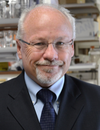
Steve Soper, Foundation Distinguished Professor, Director, Center of BioModular Multi-scale System for Precision Medicine, The University of Kansas
Prof. Soper is a Foundation Distinguished Professor in Chemistry, Bioengineering, and Mechanical Engineering at the University of Kansas. At KUMC, Prof. Soper holds an adjunct appointment in the Cancer Biology Department and is a member of the KU Cancer Center.
Prof. Soper has secured extramural funding totaling >$135M, has published over 245 peer-reviewed manuscripts (h index = 70; >18,000 citations); 31 book chapters and 91 peer-reviewed conference proceeding papers, and is the author of 20 patents. He is also the founder of a startup company, BioFluidica, which is marketing devices for the isolation and enumeration of liquid biopsy markers. Soper recently founded a second company, Sunflower Genomics, which is seeking to market a new DNA/RNA single-molecule sequencing platform. His list of awards includes Ralph Adams Award in Bioanalytical Chemistry, Chemical Instrumentation by the American Chemical Society, the Benedetti-Pichler Award for Microchemistry, Fellow of the AAAS, Fellow of Applied Spectroscopy, Fellow of the Royal Society of Chemistry, R&D 100 Award, Distinguished Masters Award at LSU and Outstanding Scientist/Engineer in the state of Louisiana in 2001. Finally, Prof. Soper has granted 60 PhDs and 7 MS degrees to students under his mentorship. He currently heads a group of 20 researchers.
Sven Kreutel Biographical Sketch
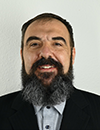
Sven Kreutel, Particle Metrix GmbH and CEO, Particle Metrix Inc.
Sven Kreutel studied biology at the University of Hohenheim in Stuttgart, Germany. After his graduation in biology, he received his PhD in microbiology and protein biochemistry at the University of Hohenheim under Prof. Dr. Andreas Kuhn and Dr. Dorothee Kiefer working on the light sensing and signal transduction in photosynthetic bacteria. Since then he worked in different sales and sales manager positions within the life science industry from clinical research over biology to nanoparticle sciences. In 2021 he was appointed as CEO of the American subsidiary of Particle Metrix.
Terry Morgan Biographical Sketch

Terry Morgan, Professor, Oregon Health & Science University (OHSU)
Dr. Morgan is a Professor of Pathology and Biomedical Engineering at Oregon Health & Science University (OHSU) in Portland, Oregon, USA. He has been an NIH-funded investigator since 2012 and he has worked with BD Biosciences since 2016 to develop, validate, and begin research trials using nanoscale high resolution flow cytometry to image, count, and isolate extracellular vesicles (EVs). Dr. Morgan is the leader of the EV research group at the Center for Developmental Health at OHSU. He is also the leader of the flow cytometry EV group at the Knight Cancer Institute to test its potential as a diagnostic platform for early cancer detection.
Vasileios Toxavidis Biographical Sketch
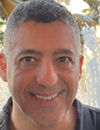
Vasileios Toxavidis, Senior Sales Account Manager, Beckman-Coulter Life Sciences
Has a technical background in flow cytometry.
Yu-Hwa Lo Biographical Sketch
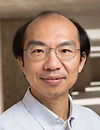
Yu-Hwa Lo, Professor, University of California San Diego
Yuhwa Lo received his PhD in electrical engineering from UC Berkeley. He has been a professor of University of California, San Diego since 1999. He is also the director of the UCSD Nano3 (Nanoscience, Nanoengineering, Nanomedicine) Facility. His research interests include microfluidics, lab on a chip, biosensors, biomedical instrument, biophotonics, nanophotonic and optoelectronic devices. He has around 400 publications and been award 31 patents. He is a fellow of the IEEE and the Optical Society of America.
